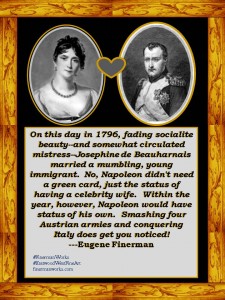Wedding Anniversaries and More Royal Gossip
Posted in General, On This Day on March 9th, 2011 by Eugene Finerman – Be the first to comment On this day in 1796, fading socialite beauty–and somewhat circulated mistress–Josephine de Beauharnais married a mumbling, young immigrant. (No, Napoleon didn’t need a green card, just the status of having a celebrity wife.) Within the year, however, Napoleon would have status of his own. Smashing four Austrian armies and conquering Italy does get you noticed!
On this day in 1796, fading socialite beauty–and somewhat circulated mistress–Josephine de Beauharnais married a mumbling, young immigrant. (No, Napoleon didn’t need a green card, just the status of having a celebrity wife.) Within the year, however, Napoleon would have status of his own. Smashing four Austrian armies and conquering Italy does get you noticed!
The couple had no children. Josephine, however, does have descendants. Napoleon was only her second husband. Her first was Vicomte Alexandre de Beauharnais. As a Vicomte during the French Revolution, Monsieur Beauharnais obviously had a bad sense of timing. He left his widow with a daughter and a son. Hortense de Beauharnais–with the emphasis on the first syllable–would marry Napoleon’s brother Louis, but didn’t even pretend that all the children were his. At least Napoleon III was certain that Josephine was his grandmother.
Josephine’s son was Eugene, a name that indicated his charm and ability. He really was a capable, admirable individual. Yes, he was appointed Viceroy of Italy through nepotism, but he governed so well–and how often do you hear efficient Italian government in the same sentence–that the Allies seriously discussed letting him stay on after Napoleon fell. Of course, competence would have made the other rulers look bad, so Eugene had to be fired. He had married a Bavarian princess, so he was in no danger of starvation.
Eugene de Beauharnais and his frau had a daughter named Josephine, a sentimental if tactless choice. Young Josephine in turn married a nice French boy who happened to be the Crown Prince of Sweden. (In an early example of a guest worker program, Sweden had offered its throne to a French general named Bernadotte.) Her grandchild became the Queen of Denmark and her great-grandson became the King of Norway.
So the royal houses of Scandinavia are all descended from the first Mrs. Bonaparte. Even after a messy divorce, that is not a bad compensation.